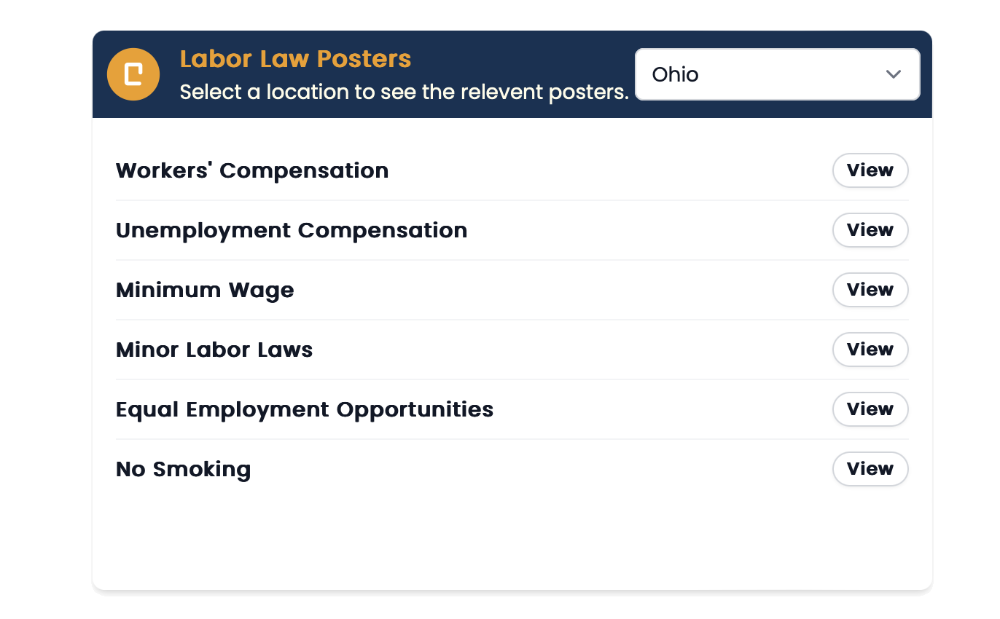2024 Are Digital Labor Law Posters Legal?
Labor law posters, which inform employees of their rights under federal and state laws, are required to be physically displayed in workplaces. However, employers are increasingly wondering how to ensure their remote employees can access these mandatory notices and how they can do it in a legal way.
Let’s explore the legality of digital labor law posters and how to provide for your remote workforce.
Labor Law Poster Basics
Labor law posters are mandatory notices that employers must display in the workplace to inform employees of their rights and protections under federal and state employment laws.
These posters cover a wide range of topics, including minimum wage, overtime pay, workplace safety, anti-discrimination, and family and medical leave.
The purpose of labor law posters is to ensure that employees are aware of their rights and can report violations or seek assistance if needed. By requiring employers to prominently display these notices, government agencies aim to promote fair labor practices and prevent exploitation of workers.
Failure to properly display required labor law posters can result in fines and legal penalties for employers. In some cases, non-compliance may also be used as evidence in employee lawsuits or government investigations into labor violations.
Employers now use digital solutions to provide mandatory notices to employees who don't regularly report to a physical workplace.
While electronic posting can help keep remote workers informed, it does not fully replace the legal requirement for physical posters in most cases.
Are you tired of researching multiple state poster laws? Check out ePoster's Automatic Poster Updates and Features
Impact of Remote Work on Labor Law Compliance
The shift towards remote work has introduced new challenges for employers in maintaining compliance with labor laws:
With employees working from various locations, often across state lines, navigating mulitple federal and state regulations becomes more complicated.
Remote work arrangements can blur the lines between work hours and personal time, making it difficult to track overtime and ensure proper compensation accurately.
Remote work raises questions about which jurisdiction's laws apply, as employees may be subject to different regulations based on their physical location.
Employers must also consider a safe work environment and address potential workers' compensation claims for remote employees.
To mitigate legal risks, employers should establish clear remote work policies, outlining expectations for hours, communication, and data security, while staying informed of the evolving legal landscape surrounding remote work.
Digital Poster Legality Considerations
While digital labor law posters can be a convenient way to share required notices with remote employees, they do not fully satisfy legal requirements in most cases.
The U.S. Department of Labor has stated that electronic posting is an acceptable supplement to, but not a replacement for, physical posting of labor law notices in the workplace.
However, there are some exceptions where electronic-only posting is permitted for certain laws. For example, the Fair Labor Standards Act (FLSA), Family and Medical Leave Act (FMLA), and Employee Polygraph Protection Act (EPPA) allow for electronic posting if all employees exclusively work remotely, customarily receive information from the employer via electronic means, and have readily available access to the electronic posting at all times.
Even when providing digital versions of posters, employers must ensure they are as accessible as physical postings.
We recommend that digital posters be easily available without barriers like paywalls, and employees must be notified of where to find them, such as through email, the company intranet, or employee handbooks.
Ultimately, while digital labor law posters can help keep remote employees informed, they are not a complete substitute for physical workplace postings in the eyes of federal and most state laws. Employers should use digital posters to supplement, rather than replace, required hard-copy notices to maintain full compliance.
Ensuring Accessibility of Digital Posters for All Employees
When providing digital labor law posters, employers must ensure they are accessible to all employees, including those with disabilities.
Digital posters should follow web accessibility guidelines, such as using sufficient color contrast, providing text alternatives for images, and being navigable by keyboard.
For employees with visual impairments, digital posters should be compatible with screen reader technology. Employers can also offer alternative formats like audio or video versions of the posters. It's important to use plain language, simple layouts, and descriptive headings to make the content understandable for employees with cognitive disabilities or limited English proficiency.
By designing digital posters with accessibility in mind, employers can ensure compliance information is effectively communicated to their entire workforce.
Federal Digital Poster Laws
The U.S. Department of Labor has provided guidance on electronic posting of certain federal labor law notices, specifically for the Fair Labor Standards Act (FLSA), Family and Medical Leave Act (FMLA), Employee Polygraph Protection Act (EPPA), and Service Contract Act (SCA).
For these laws, electronic-only posting is considered an acceptable substitute for physical posters only if all employees:
Work remotely
Customarily receive information from the employer electronically
Have readily available access to the electronic posting at all times
If an employer has both on-site and remote workers, physical posters must still be displayed in the workplace. In these cases, digital versions may be used to supplement the hard-copy notices for remote employees.
The DOL emphasizes that regardless of posting method, it is the employer's responsibility to ensure all affected employees have access to required notices.
Electronic posters must be as easily accessible as a physical posting would be in the workplace. Employers should also consider that some laws, like the FMLA, require notices to be visible to job applicants as well.
In these cases, digital posters should be available on websites or online application portals. While the DOL has provided some flexibility for electronic posting, it's important to note that these guidelines apply only to specific federal laws.
Many other posting requirements, including state and local notices, must still be physically posted in most cases.
State-Specific Digital Poster Requirements
While federal guidelines provide some flexibility for electronic posting of certain labor law notices, many states have their own requirements that employers must follow.
Some states have recently enacted laws specifically addressing digital labor law posters for remote workers.
In New York, a law effective December 16, 2022 requires employers to provide digital versions of all required labor law posters to employees, either via website or email.
This is in addition to physically displaying the posters in the workplace. Employers must also notify employees that the digital versions are available.
Similarly, Illinois passed a law effective January 1, 2024 mandating that employers with remote workers email or post online the required Minimum Wage and Overtime, Equal Pay, Wage Payment and Collection Act, and Child Labor posters. Employers of day and temporary laborers must also provide the relevant notice electronically.
Other states like Colorado and Oregon have laws requiring certain posters to be shared with remote employees, either digitally or by mail. Colorado's Paid Leave, Whistleblowing, & Protective Equipment poster and Oregon's Paid Family and Medical Leave Insurance poster fall under these requirements.
Some states, including Arizona, Maine, and Washington, have guidance suggesting that remote employees must be provided required notices, which can be done electronically, but have not passed specific laws mandating digital delivery.
As remote work continues to be prevalent, it's likely that more states will update their labor laws to include digital posting requirements.
Employers should stay informed of any changes in the states where they have employees working remotely to ensure full compliance with both federal and state regulations.
Employer Best Practices
Here are some best practices for employers to ensure compliance with labor law posting requirements, including for remote workers:
Post physical copies of all required federal and state labor law posters in a conspicuous location in the workplace, even if also providing digital versions to remote employees.
Provide easy digital access to required posters for remote workers, such as through the company intranet, employee portal, or via email.
Make sure the digital versions are available at all times without barriers like paywalls.
Notify remote employees of where and how to access digital labor law posters, such as in the employee handbook, onboarding materials, or periodic email reminders. Don't assume employees will seek out this information on their own.
Make digital versions of applicable posters visible to online job applicants as well, not just current employees. Some laws, like the FMLA, require notices to be accessible to applicants.
Keep records of how and when digital posters are shared with each remote employee. This documentation can help prove compliance if ever questioned by government agencies or in employee legal claims.
Stay informed of evolving federal, state, and local requirements related to digital posting for remote workers. Laws are changing rapidly in this area, so employers must be proactive in monitoring for updates in the locations where they have remote staff.
Consider using a labor law poster subscription service or consulting with legal counsel to help navigate the complexities of physical and digital posting compliance across multiple jurisdictions.
ePoster: Advancing Digital Posting
Here at ePoster, we are actively working to make digital labor law posting requirements clearer and more accommodating for the growing remote and hybrid workforce.
The company is currently collaborating with legislators in Ohio and Florida to update labor laws to explicitly allow for digital posting as a legal alternative to physical workplace notices.
By engaging directly with state governments, ePoster aims to modernize posting regulations to better reflect the realities of today's increasingly distributed work arrangements.
The goal is to establish clear guidelines for employers to follow when providing mandatory notices electronically, ensuring remote employees have easy access to the information they need about their rights and protections.
While Ohio and Florida are the initial focus, ePoster has plans to expand its efforts to additional states in the future. As more businesses adopt long-term remote and hybrid work policies, updating labor laws to provide flexibility in posting requirements will be essential for maintaining compliance and keeping all employees informed, regardless of their physical work location.
ePoster's Digital Poster Solutions
Over the years, ePoster has catered to those specifically wanting to evolve in the digital HR space. By providing tools that support both remote and onsite work environments, ePoster has helped transform traditional HR practices into modern, digital solutions.
ePoster
Features:
Federal & State Posters
Spanish Poster Included
Intranet Widget Integration
Email Send Out & Sign Off System
Master Records of Acknowledgement
Breakroom Digital Posters (Coming Soon)
Automatic Updates
Notification When There Are New Updates
PDF Poster Download
Fillable Posters Within Platform
Custom Poster Uploads
Link to Send to Employees
ePoster may be the ideal solution for your business if you have remote workers across multiple states. With features like intranet widget integration, email sign-offs, and a master record of signatures-ePoster makes it easy to manage and track acknowledgment.
The upcoming addition of Break room Digital Posters will better support companies within physical workplace settings. If you're looking for a comprehensive digital labor law poster solution, ePoster could be exactly what you need.









